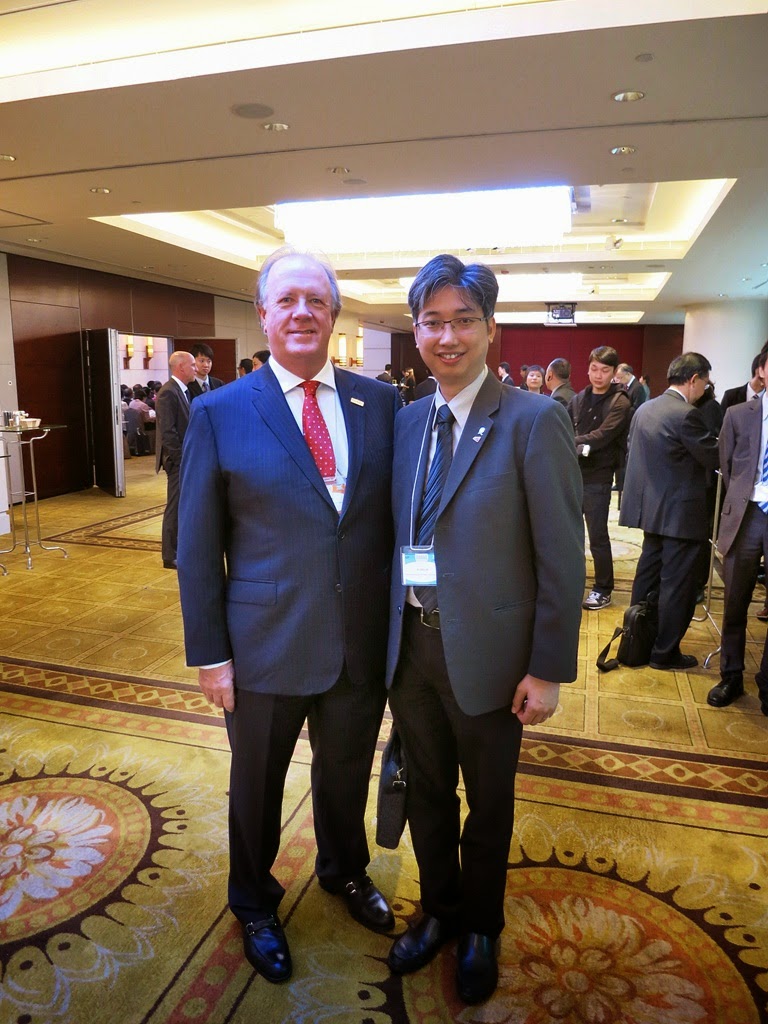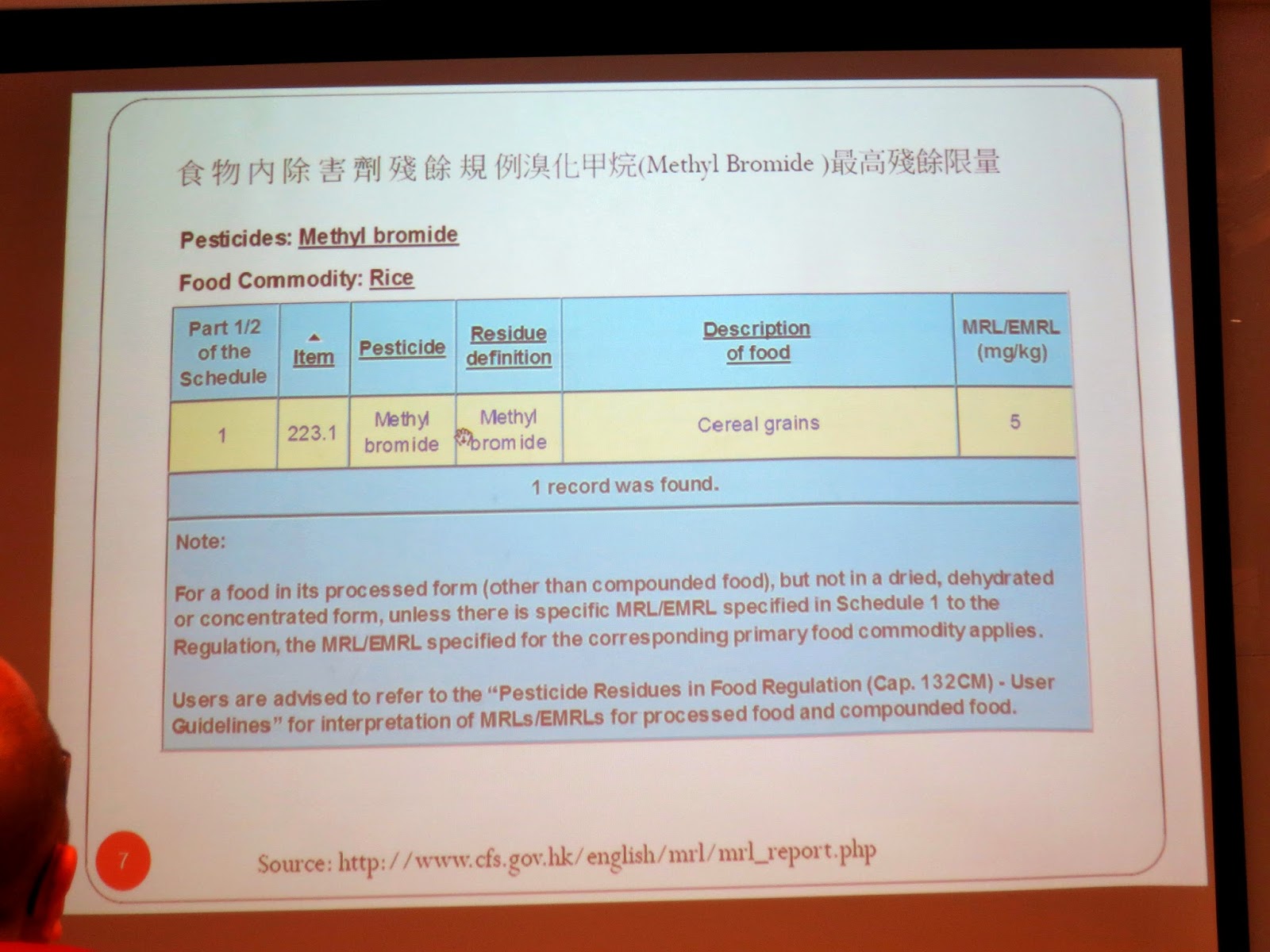Before the forum, I took a photo with HKQAA friends in front of the forum banner
(Left: Mr. Bryan Peng (Assistant Director), Dr. Micheal Lam (CEO), Ir. Dr. The Hon WK Lo (Chairman), I, Ms. Bess Choi (Asst. Director, Corporate Finance), Meico Cheong (Business Manager))
I presented a gift to Dr. WK Lo which is a pin of CityU 30th anniversary because Dr. Lo is an Adjunct Professor in SEEM Dept. of CityU.
I also met Dr. Nigel Croft (ISO Technical Subcommittee on Quality Systems (ISO/TC176/SC2) and took a photo for memory.
Morning Forum
In the beginning, Ir. Dr. The Hon WK Lo (Chairman of HKQAA and Representative of the Engineering Functional Constituency of the Legislative Council) gave a welcoming speech. He briefed the history and service of HKQAA in the past 25 years especially on sustainability. Dr. Lo also mentioned the new registration scheme named Hong Kong Cooking Oil Registration Scheme (HKCORS).
Ms. Anissa Wong (Permanent Secretary for the Environment, HKSAR) gave an opening speech. She said HKQAA was a major driver in different section for social and environmental conservation.
Mr. H.M. Wong (Principal Environmental Protection Officer, EPD, HKSAR) was the first speaker and his topic entitled “Sustainable Development of Recycling Industry – New Challenges, New Measures, New Opportunities”. Firstly, Mr. Wong introduced the First Sustainability Development Strategy for Hong Kong which had three main focus included Solid Waste Management, Renewable Energy; and Urban Living Space.
Mr. Wong said they set the target to reduce the current per capita Municipal Solid Waste (MSW) disposal rate of 1.27kg per day to 0.8kg per day by 2022 (40% Reduction!). The following diagram demonstrated four key elements in waste management strategy and recycle. Mr. Wong also added that it was a mindset change from the Waste to Resources (W to R).
Mr. Vincent Kwan (Director and General Manager, Hang Seng Indexes Company Limited) was the second speaker and his topic was “Promoting Sustainable Investment: Linkage between Sustainability Rating and Financial Performance”. He explained the definition of Sustainable Development as forms of progress that meet the needs of present without compromising the ability of future generations to meet their needs (Brundtland Report, WCED, 1987).
Then Mr. Kwan briefed 4 key players to support sustainable investment included Investors & Asset Owners, Fund Managers, Listed Companies and Index Compilers. Sustainable and Responsible Investment (SRI) is the integration of social and environment criteria into investment decisions with the goal of aligning financial activities with social and environmental objectives, values, or beliefs. This is often achieved through negative or positive screening, as well as shareholder activism.
Lastly, Mr. Kwan said Hang Seng Sustainability Index (HSSUS) for Corporation acts as a tool for bridging the gap between companies and investors. The index composition was described and compared with Hang Seng Index performance was demonstrated with good trend of return.
Mr. Christoph Ganswindt (Executive Director, Information Technology and Sustainability, The Hong Kong Jockey Club) was the third speaker and his presentation title named “Path to a Low-carbon City: Demonstrate Hong Kong Organizations’ Carbon Performance”. He said EPD had proposed a carbon intensity reduction target of 50%-60% by 2020 as compared with 2005 level. So we needed to joint hands to reduce carbon emission.
Mr. Ganswindt mentioned they observed many corporates or organization in Hong Kong had started their journeys to reduce carbon emission but no common platform for sharing carbon performance information in 2012. Therefore, HKJC and HKQAA jointed to establish a Carbon Disclosure e-Platform (CDeP) which was a free web-based disclosure platform. Until now, 27 organization participated the Carbon Performance Survey using this platform and total GHG emission reported 87,436,738 tCO2e/year on 31 Oct 2014. The final result would be published on Q2 in 2015.
Finally, HKJC Carbon Management and Engagement was stated which included carbon footprint, electricity consumption, supply chain management, green best practices, waste management, water/resources conservation.
The fourth speaker was Ms. Maria Cheung (General Manager – Corporate Communication of New World Development Company Limited) and his presentation entitled “Improving Social Mobility – A Business Sector Prospective”. Ms. Cheung shared New World Development Company Limited’s vision was to build a better society through innovation and sustainable growth.
Ms. Cheung mentioned one of missions that care for the communities we serve and respect the environment we live in. Then she introduced their corporate sustainability@New World in which consisted Profit, People and Planet.
Networking Break
I met Dr. CN Ng (Associate Professor, Dept. of Geography, HKU) who is my teacher in CityU.
Then HKSTP team took a group photo with HKQAA partners.
(Left: Mr. Bryan Peng, Mr. Antony Chan (Manager, Incubation Program, HKSTPC), Mr. Kevin Edmunds (Senior Manager, Sustainability Development, HKSTPC), I, Ms. Bess Choi and Mr. Adam Wong (Asst. Manager, BD-Manufacturing & Service))
Mr. Kevin Edmunds (Senior Manager, Sustainability Development, Hong Kong Science and Technology Parks Corporation) was the fifth speaker and his topic was “Cultivating Innovation and Technology to Foster a Sustainable Economy”. Kevin briefed Science Park Phase 3 environmental design.
The Sustainable Master Planning included microclimate design which reduced ambient outdoor temperature, extensive green landscape, Sun shading device, cool roof surface, motorized operable windows in office, LED lighting and Natural daylight penetration, as well as, many different showcases for sustainability features.
The last speaker was Dr. Nigel Croft (Chairman, ISO Technical Subcommittee on Quality Systems (ISO/TC176/SC2) and his presentation named "The Evolving ISO Standards: Catering for a Broader Spectrum of Social Risks". Firstly, Dr. Nigel Croft introduced ISO Mission to us “ISO develops high quality voluntary International Standards which facilitate international exchange of goods and services, support sustainable and equitable economic growth, promote innovation and protect health, safety and the environment”.
Dr. Nigel Croft said ISO Standards were for better world and showed how different standards affected our life. He said quality is wide meaning different things such as Quality about People, Quality about Environment, and Quality for Future Generation to Sustainability.
Finally, Dr. Nigel Croft shared his core values “trying to do the right thing” and maintaining the right balance among Self, Family, Work, Friends and Neighbors, as well as, Society. Based on his experience, successful organizations combined the 5 key components into their culture below:
i) Care (Wanting to do things right)
ii) Method (Clearly establishing how to do things right)
iii) Discipline (To continue to do things right, and take appropriate actions when things go wrong)
iv) Pride (In doing things right)
v) Innovation (To find ways to do things better next time)
Dr. Nigel Croft used Hersey Model to explain how to “Doing the right thing”.
Panel Discussion was performed at the end of Morning Session and the guest moderator was Dr. Nigel Croft (ISO Technical Subcommittee on Quality Systems (ISO/TC176/SC2)).
Dr. Micheal Lam (CEO, HKQAA) gave a closing remark for this morning forum.
Afternoon Celebration Cocktail Reception
Before the Ceremony, I met Mr. So Kam Leung, Gregory (GBS, JP, Secretary for Commerce and Economic Development, HKSAR) and we took a photo for memory.
Photo with HKQAA friends, HKSTP colleague and HKSQ members
(Left: Mr. Nic Chan (Account Manager - Manufacturing & Service), Mr. KT Ting (General Manager, Market Research Business), I and Mr. Bryan Peng (Assistant Director))
(Left: Dr. Micheal Lam (CEO, HKQAA), Mr. Kevin Edmunds (Sr. Manager, Sustainability Development, HKSTPC) and I)
Photo with GP Battery International Ltd.
(Left: Mr. Jack Shu (Manager, EHS), Mr. Daniel Tong (General Manager, SBU, NiMH Battery & Charger), I, Mr. Larry Lee (Customer Services & Compliance Quality Manager) and Mr. Percy Chan (Quality Director))
I took a photo with Mr. Ronald, YF Lau (Chairman, Hong Kong Food Hygiene Administrators Association; Vice-President, Hong Kong Food Council).
HKSQ Chairman Mr. Peter Fung (Left 3) took a photo with GP members.
Starting the Ceremony, Ir. Dr. The Hon WK Lo (Chairman of HKQAA and Representative of the Engineering Functional Constituency of the Legislative Council) gave a welcoming remarks.
Mr. So Kam Leung, Gregory (GBS, JP, Secretary for Commerce and Economic Development, HKSAR) gave an opening remark. Mr. So said we used quality product and service in Hong Kong and created a good brand “Make by Hong Kong” or “Make in Hong Kong”. Hong Kong government had different scheme and funds to support SME to increase their competitiveness.
Celebration Ceremony for the Hong Kong Quality Assurance Agency 25th Anniversary
(Left: Dr. Michael Lam, Ir. Dr. The Hon WK Lo, Mr. So Kam Leung, Gregory and Mr. CS Ho (Deputy Chairman, HKQAA))
All HKQAA Board members toast for celebrating the success of HKQAA 25th Anniversary Forum and Celebration Cocktail Reception.
HKQAA 25th Anniversary Recognition for Outstanding Organizations
Hong Kong Science and Technology Park Corporate was acclaimed as a “Outstanding Organization with Comprehensive Management System”. Ir. Dr. The Hon WK Lo presented the award to Mr. Kevin Edmunds (Senior Manager, Sustainability Development) and I (Manager, Quality System).
Other awardees included GP Battery and Hang Seng Management College for CSR.
(Right: Mr. Daniel Tong (General Manager, SBU, NiMH Battery & Charger) and I)
(Left: Dr. Shirley Yeung (Director of QA, Assistant Professor, Department of Supply Chain Management, Hang Seng Management College)) We performed some audits together in HKQAA long time ago.
At the end of the celebration cocktail reception, Dr. Michael Lam (CEO, HKQAA) gave a closing remarks.
Photos before leave:
HKSQ team
(Left: I, Mr. Peter Fung (Chairman) and Ir. Dr. Sammy Wan (Head of Quality, Safety and Envir., Analogue Group of Companies - ATAL))
(Left: Dr. Michael Lam, Mr. Peter Fung, Ir. Dr. The Hon WK Lo, I and Mr. CP Chan (COO, HKQAA))
(Left: Mr. Gary Miao (Asst. GM), Mr. Bryan Peng, Ms. Stephanie Ying XU (Associate Director, SZAQ), Mr. Peter Fung, I and Mr. Nic Chan)
Very Old HKQAA friend Mr. Jacky Yeung (Asst. Sr. Manager, Process Improvement Unit).
Lastly, HKQAA family took a group photo.
Previous HKQAA Symposium:
2013: http://qualityalchemist.blogspot.hk/2013/11/hkqaa-symposium-2013-esg-management.html
2012: Part 1 - http://qualityalchemist.blogspot.hk/2012/12/hkqaa-symposium-2012-part-1.html; Part 2 - http://qualityalchemist.blogspot.hk/2012/12/hkqaa-symposium-2012-part-2.html
2011: http://qualityalchemist.blogspot.hk/2011/11/hkqaa-symposium-2011-performing-your.html
2010: Part 1 - http://qualityalchemist.blogspot.com/2010/11/hkqaa-symposium-2010-sustainability.html ; Part 2 - http://qualityalchemist.blogspot.com/2010/11/hkqaa-symposium-2010-sustainability_26.html
2009: http://qualityalchemist.blogspot.com/2009/11/smaller-carbon-footprint-hkqaa.html
2008: http://qualityalchemist.blogspot.com/2008/12/hkqaa-symposium-2008-green-day.html
Reference:
www.hkqaa.org
www.hksq.org





















































